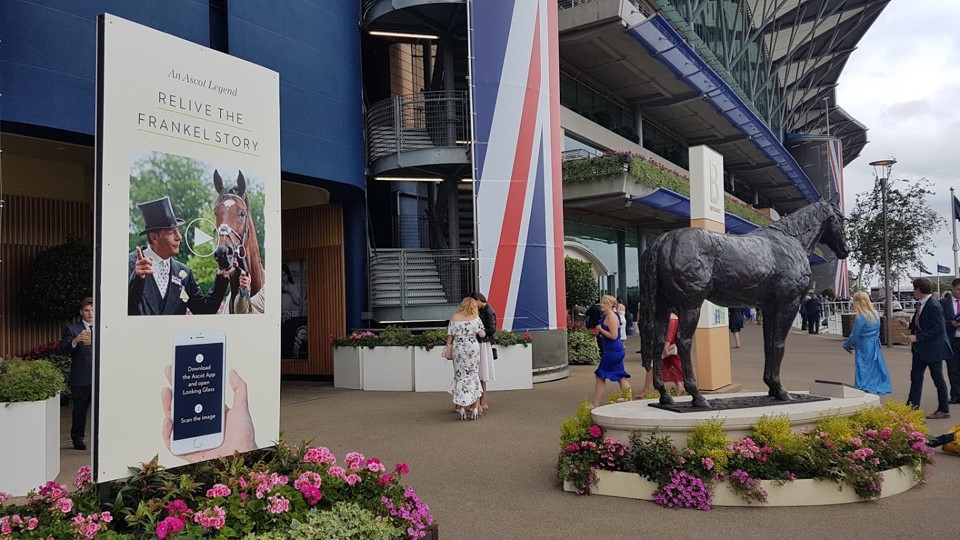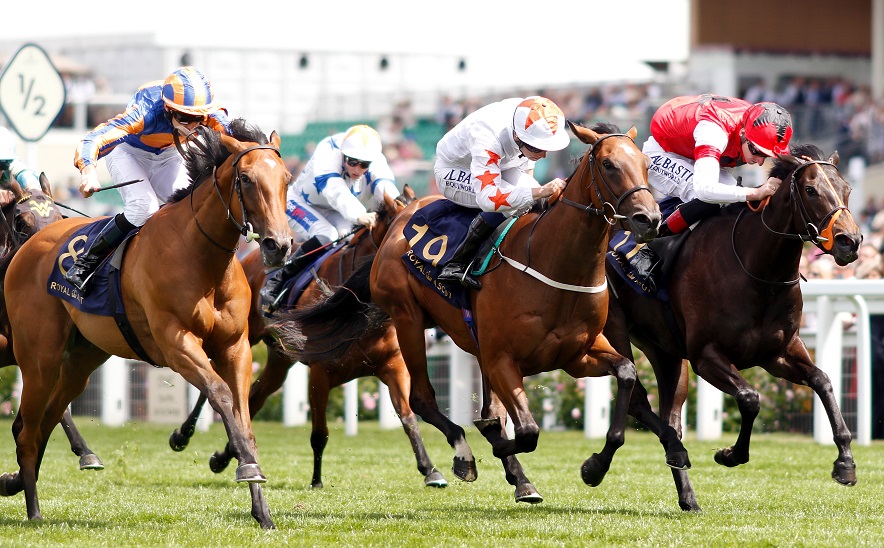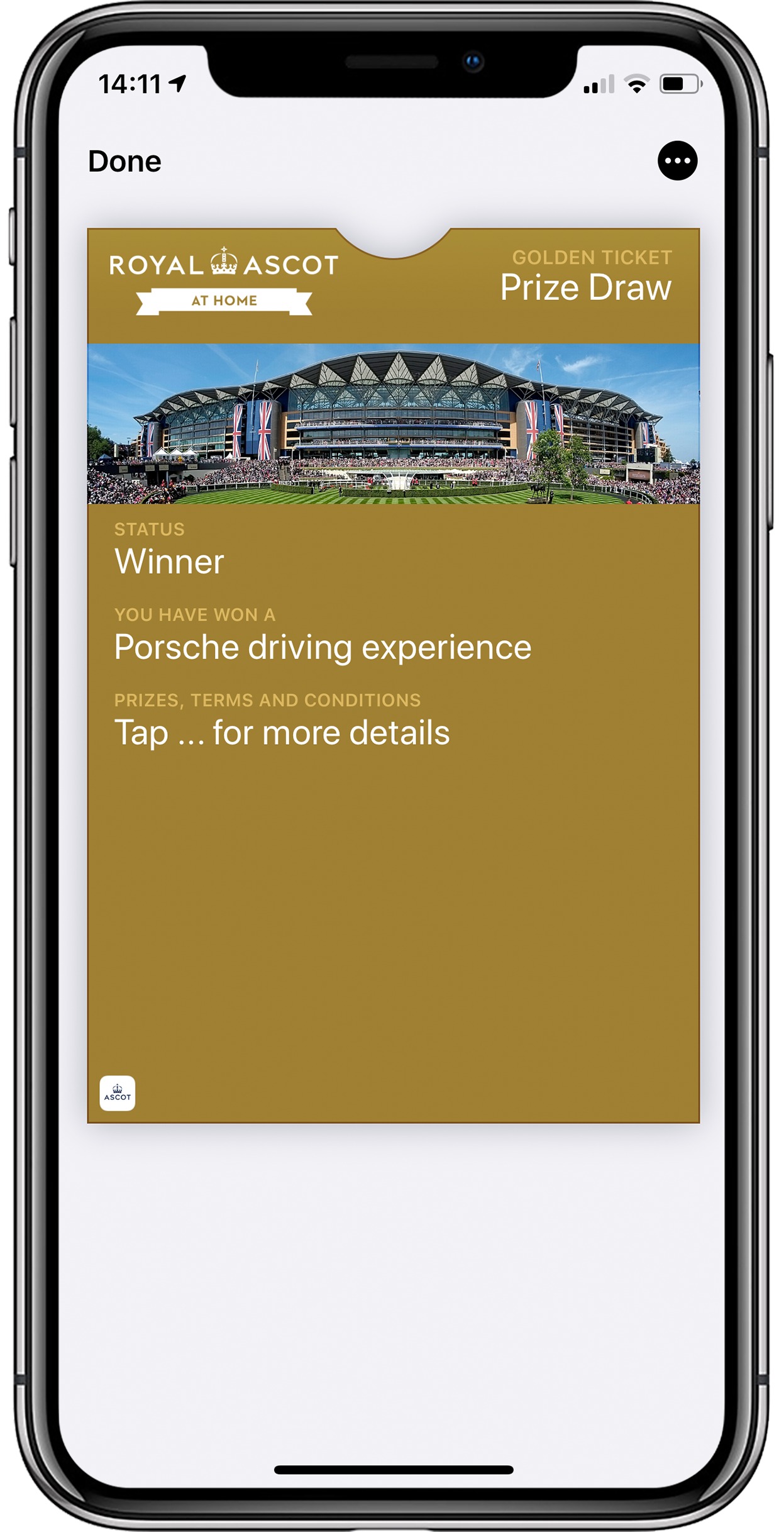- June 30, 2020
- Posted by: SportsV
- Categories: Event News, Featured Articles, Features, Home News, Industry News, Interviews, News, Press Releases

In this latest in-depth industry interview, we hear insights from George Vaughan, Head of Technology for Ascot Racecourse, who discusses the unique challenges of the current climate, how they’re utilising technology with concepts like their “Golden Ticket” loyalty program, which sees NFC technology being used in a whole new way, and where the sector is headed post pandemic.
George recently sat down, albeit virtually, with Sports Venue Business (SVB) CEO, Katie McIntyre, to discuss the challenges being faced, how technology is being used to great effect and where we go from here…
George, can you start off by telling us a bit about yourself and your career journey, including any standout moments?
I’ve been with Ascot Racecourse since March 2018, so just over 2 years now, and during that time I’ve been working on modernising the venue from a technology perspective.
Prior to that, I worked for the RFU at Twickenham Stadium, where I delivered a number of unique projects in the run up to the 2015 Rugby World Cup and then put the foundations in place for the venue to become the largest open-loop, cashless stadium in the world at that time.
Between 2015 and 2017, I also helped Twickenham and the RFU win 7 of the 9 industry awards it was nominated for around payments and technology, including Venue of the Year (2016) and Best Venue Tech of the Year (2016) both with Stadium Business Summit.
My portfolio of work in the sports sector has covered everything from Networking, Infrastructure, CRM, Payments and POS (Point of Sale) to Augmented Reality (AR), Virtual Reality (VR), Digital Ticketing and Access Control, as well as a host of new, emerging technology solutions.
I’ve always been keen to understand what goes on in different industries and having worked in other areas like education, retail and health, has led me to appreciate that most technology is now able to satisfy multiple sectors. Our customers arguably spend more time in supermarkets, gyms, restaurants and even airports, than they do in stadiums or racecourses so learning how they interact in those spaces makes us better equipped to deliver on their expectations when they are our guests.
Back in 2012/13, one of my very early drivers at the RFU was to get the venue to embrace the idea of contactless card payments, being acutely aware of the success the technology was already enjoying in transport and travel. And now, fast forward 7-8 years, and we as a global society are impacted by the Covid-19 pandemic, which is starting to reject cash completely, as it represents a key transmission risk. The reality is that more and more venues followed the example first set at Twickenham and that trend will accelerate as we look to finally welcome customers and fans back.
Ascot has been working hard to progress our technology offerings to customers and over the last eighteen months we have seen significant upgrades to our audio-visual estate as well as further investment into our app, access control and digital ticketing. The aim is to give people something unique, but that ambition comes with a greater challenge because most people’s home environments are now more sophisticated than ever before.
Big screen, 4K displays, high-end audio systems, the choice of what food to eat and who to share the experience with all mean that watching a sporting event or music concert from home becomes a very personally tailored affair. We have to provide customers with a strong enough reason to buy the ticket, make the journey and give up the commodity most precious to everyone: their time. From a racing perspective, that can be an entire day, so we have a duty to make the experience as enticing and special as possible.
Looking at the customer from a number of points of view has always been my focus. Across all the work I’ve done in sport, I’ve always tended to spend a limited amount of time looking at what other venues are doing because that is only a very small part of the true picture. If you all fish from the same pond, you’re ultimately all going to serve the same catch.
Consequently, much of what was achieved at Twickenham, and my team and I are now completing at Ascot has been inspired by learnings away from sport. In this changing world, I believe to truly understand your customer doesn’t mean focusing on the short amount of time they spend with you but instead, understanding what they do for the majority of the time they are somewhere else.

Royal Ascot 20 Jun 2018 – Pic Steven Cargill / Racingfotos.com
In your role as Head of Technology for Ascot Racecourse, what are your key objectives for the next 12-24 months? And have those objectives had to morph due to the COVID-19 pandemic?
The big focus is on upgrading our ticketing system, moving from our current platform onto a more expansive solution, with our existing ticketing provider, Vivaticket. Alongside that is the development of a defined CRM platform and the opportunity to enhance the visitor experience through the app and NFC ticketing.
Having launched NFC ticketing in 2019 and being able to offer customers an alternative to a physical paper ticket is a significant step forward. Because we work closely with key innovators in this field such as Apple, Google and ProntoCX, we are able to bring an element of creative thinking to a space that has traditionally often struggled to be inventive.
We will also be upgrading all of our payment devices to the latest VAS enabled, Verifone P400s, which will in turn allow us to explore opportunities around loyalty programs and more mobile driven initiatives. These new Verifone devices will also allow us to explore NFC technology for betting and drinks vouchers all as part of the digital ticket.
Beyond that, I’d love to get us to the point (and we’re not that far off it at the racecourse) when people in our venue paying with their smart phone, can be offered the chance to sign up to a loyalty scheme via their mobile device in no more than two clicks, as part of the overall transaction.
The end goal is always mobile. I purchase my ticket using Apple Pay, Samsung Pay or Android Pay, I have that ticket downloaded to my mobile wallet, I use my mobile to travel from where I am to where I need to get to, I use it to scan myself into the venue, I use it to make any purchases that I want to buy whilst I’m there, I find my way around the venue and get information on the event via the Ascot app and I even use my phone to bet! This is the ultimate objective and it makes perfect sense as it already buys into the behavior pattern of most people. We might forget our wallets. We might even forget our house keys. But how many of us generally forget our mobiles?
We are also working with Mastercard, further to a body of work completed during lockdown, which will see us deploying their Pay By Bank app for payment, including at POS points, which further focuses on non-touch technologies.
Finally, Ascot is midway through a corporate box upgrade plan (led by our Head of Capital Projects and Estate Development, Liz Pattinson), where we are enhancing all of the boxes, including new Samsung screens, Bose audio, wireless charging and Bluetooth speakers. We have to be mindful that whatever we do, the average person at home often has technology that is far better than most modern stadiums can manage so the process of change is a constant one.

You recently launched the concept of a Golden Ticket for Royal Ascot Week. Can you tell us more about this initiative, the drivers, etc?
I was quite excited by the Royal Ascot at Home campaign, as I immediately recognised an opportunity for us to create something innovative with existing technology that didn’t feel linear.
With the investment in NFC ticketing already made, the concept I wanted to explore was the delivery of the digital ticket as a companion piece to the “At Home” event. We were already asking people to celebrate and dress up at home so why couldn’t we give them a commemorative ticket that they can put into their digital wallets as part of that experience?
We emailed all our customers a digital ticket and encouraged them to download that ticket to their smart phone wallet. Every participating customer was then automatically entered into the competition, and at the end of each day, a very small number of those tickets changed to gold, meaning that they’d won a Porsche driving experience. It was as simple as that! In the process, what it demonstrated was a new way of utilising NFC ticketing, during a time when people couldn’t be on site. It gave the ticket relevance, and more importantly, demonstrated the huge marketing and sponsorship potential of the platform.
We will be exploring further opportunities throughout the summer for other race days, but the possibilities are endless. From sponsor activations on the ticket to new customer signups and an on-site or at home digital “scrapbook”, which, if fully completed, could then reward customers, there is a lot to get excited about.
Nobody had attempted this before, so we were very proud as an organisation to have innovated the idea with our partner, ProntoCX to become the first venue globally to run it and do so with such success.

Technology has proved vital throughout the pandemic. Moving forward, how do you see technology evolving in the sports and entertainment sector?
I think technology was already changing the world of sport before COVID-19 struck but its role and indeed the dependency we have placed upon it has increased significantly since the start of the pandemic. We, just like every other venue, have been forced to confront the challenges presented by the coronavirus. It’s encouraged us to recognise that a connected world means you don’t have to conduct every meeting in person, you don’t have to be in a conventional office space to be productive and there are major benefits to be had from reshaping the working week to suit the employee rather than just the employer.
Another focus should be the key communication mechanism that many brands will use to engage with their fans and customers. Their app. But to really make a sports app relevant, you need to give it a 365 appeal. The most successful apps are the ones people come back to on a regular basis. So, outside of key events, engage with your sponsors to offer fans exclusive offers only available in the app that they can redeem throughout the year. These could be drinks’ offers they can claim as part of their weekly supermarket shop, exclusive partner tech launch events or VIP experiences only open to subscribers of the app.
From a sponsor-partnership perspective, this represents the perfect way to capture data, understand fan behavior beyond the venue and give customers true value through their association with a sporting brand.
Finally, how do you foresee venue technology evolving over the next 2-3 years?
I believe that technology initiatives planned by many venues for the next 2-3 years will have to be reassessed and, in some cases, accelerated because of the pandemic. Pre-order apps, voice activated speakers and anything that provides customers with limited touch points are all likely to come for the fore.
A venue’s ability to connect with the customer at home, the person who can’t make it to their stadium or wasn’t able to get a ticket, will also become more important, because we already know technologies like VR and AR can provide another layer of engagement for the viewer at home.
In numerous companies, people have already accustomed themselves to performing their business roles in a completely new fashion. We have quickly learned – because we had to – that you can exist as an employee away from the main office and be more productive in the process.
In my view, the traditional workplace is already dead and if anything good comes out of this lockdown, it’s the realisation that the simple removal of something like a regular two hour commute from someone’s day is going to make them a better focused employee, as well as doing something good for the planet. And this change will influence a shift in customer behaviour. Whether we like it or not, until a vaccine is found, anything we want to do, which requires us to engage or integrate with crowds – whether it’s shopping, going to a pub, visiting a stadium or racecourse – will involve more checks, longer queuing and ultimately take more time.
I believe there may be a group of people that elect to consume their sport in a different way because of the pandemic, perhaps by not even coming to a venue at all. That doesn’t mean we’re going to suddenly have empty stadiums, arenas or racecourses, but I do think we shouldn’t be naive to assume people are going to change their working practices, change their shopping habits, change the way they consume media, but continue to do exactly the same thing they’ve always down when it comes to the consumption of sport. We won’t be immune to this.
We’ve been pushed down a road because of the pandemic, and we’ve gone so far down that road that we may already be at a point where some people don’t want to go back to the way things were. There will be a significant number who adopt this position and I think our industry needs to prepare itself to accept that somethings won’t ever be exactly the same again.
I have for a long time believed that there will come a point when sporting brands have to reconsider their approach to customers coming to a venue. It is the people, the fans, the customers who provide the real atmosphere and the broadcast of sport without those fans clearly loses its appeal. You can throw all the simulated crowd noises you like at a screen but it’s the people that make the passion real.
Venues need to remember that the fan is important and the way that they treat that fan is crucial otherwise they risk losing them. What lockdown has shown us is that for many, the “at home” experience may be different, but it can be equally as good. I don’t need to worry about the travel, the security checks, the weather, the queues for food, the queues for toilets or the people I’m sitting next two because I am in control of all these things in the comfort of my own living space.
Royal Ascot
In 1961, the Queen Elizabeth II Grandstand opened at a cost of £1m, containing 280 private “dining rooms” as Ascot pioneered private corporate hospitality boxes. The Grandstand that you see today was 220 times the cost of its predecessor.
Ascot closed for a £200m redevelopment in 2004, and was reopened by Her Majesty Queen Elizabeth on 20th June 2006. The Royal Meeting was held at York during the intervening period.
Ascot is now midway through a corporate box upgrade plan, led by Head of Capital Projects and Estate Development, Liz Pattinson, which will see the enhancement of all of the boxes, including new Samsung screens, Bose audio, wireless charging and Bluetooth speakers.
George Vaughan is one of 40+ industry executives confirmed to speak at the 2020 edition of ALSD International, being held at Liverpool FC’s Anfield Stadium October 12-13.

#RoyalAscot #cashless #hospitality #sportsbiz #sportsentertainment #SportsHospitality #sportstech
The next edition of ALSD International – Europe’s leading event for the Premium Seat & Sports Hospitality sector – is being hosted at the home of the newly crowned Premier League champions, Liverpool Football Club’s Anfield Stadium, October 12-13, and will examine how to increase revenue through new builds, renovations, service expansions and technology, and how to recoup lost revenue post COVID-19.
The 2020 edition of ALSD International – organised by the Association of Luxury Suite Directors and Sports Venue Business – will feature a high-level conference, an exhibition hall showcasing the latest products, services & solutions, tours of Anfield, Everton’s Goodison Park and M&S Bank Arena, and numerous networking events, ensuring optimised opportunities to knowledge-share, network and do business.
#ALSDInternational – Europe’s leading event for the Premium Seat & Sports Hospitality sector
#ALSD – Leading the Premium Seat sector for the last 30 years
#sportsvenuebiz


